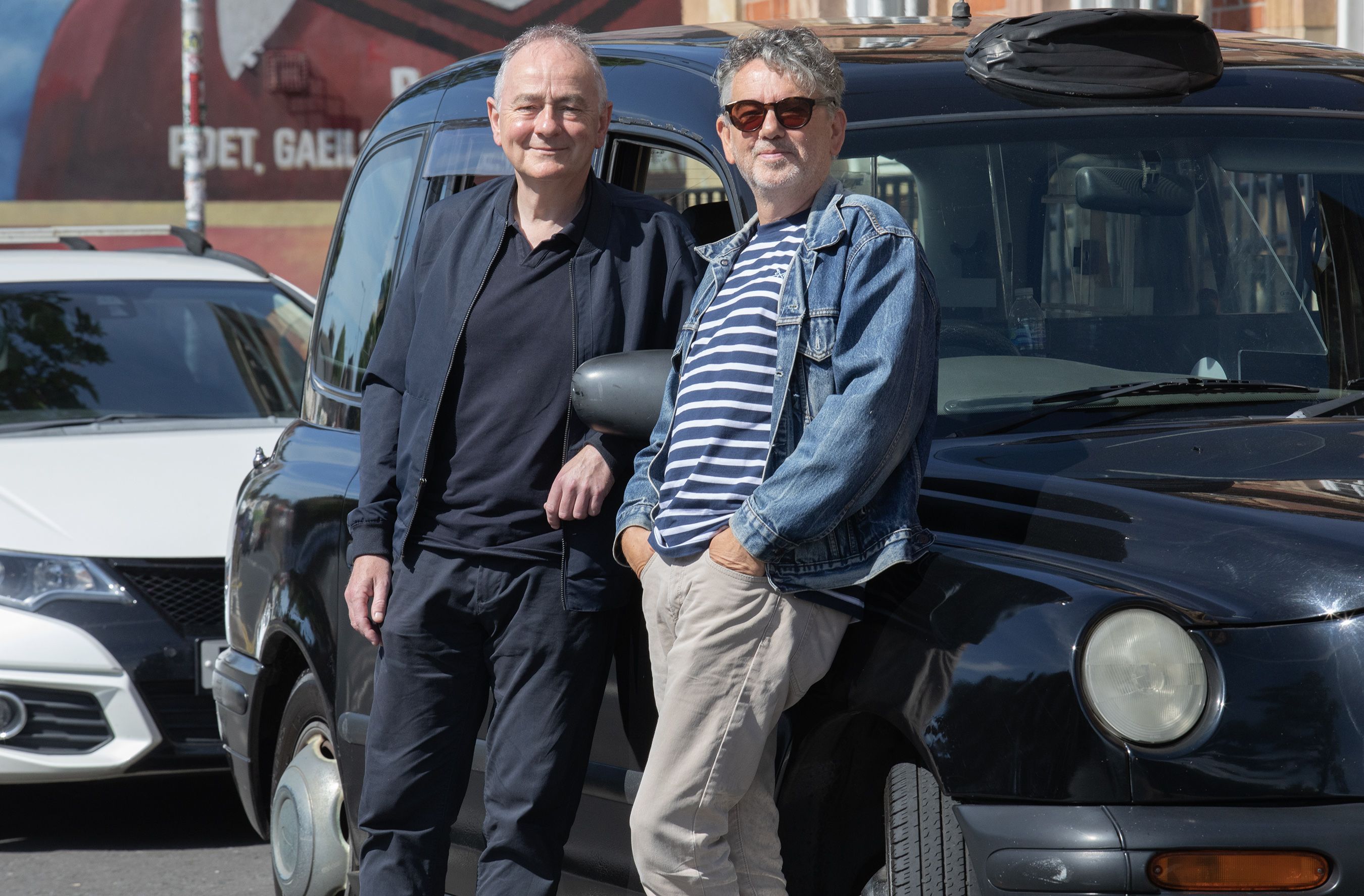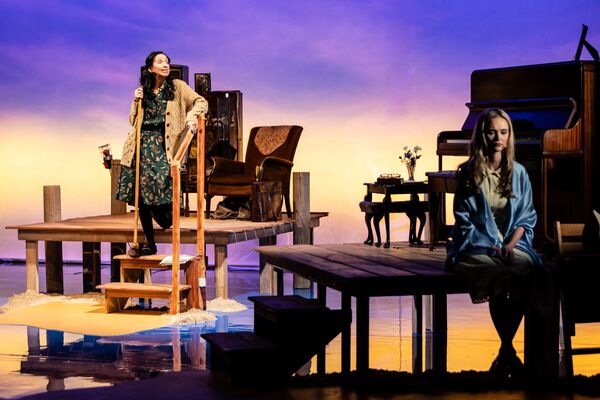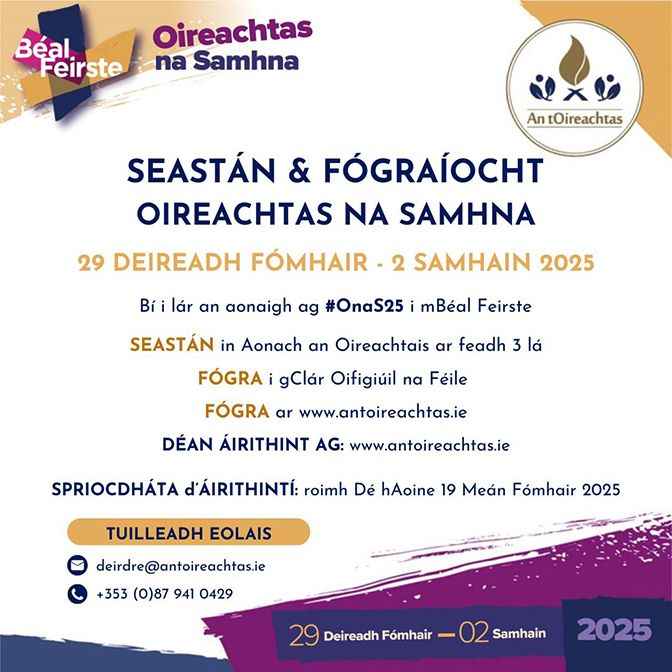IT barely registers as a footnote in the annals of Irish music history but it’s a story that has its roots firmly in West Belfast and is set to be replayed to audiences in Belfast, Liverpool, London and Glasgow this autumn.
After his band St Vitus Dance went on extended hiatus at the tail end of the 1980s, singer-songwriter Noel Burke from the Glen Road was recruited by the remaining members of legendary English band Echo & the Bunnymen to replace lead singer Ian McCulloch who had left to pursue a solo career.
And although the Liverpool four-piece were one of the most influential post-punk British bands of their generation with hits including Killing Moon, Never Stop and The Cutter, as well as the classic album Ocean Rain, Noel’s association with the Bunnymen has been much overlooked and is one of the lesser-known stories from the Irish music scene of that period.
The Gransha man spent three years fronting Echo & the Bunnymen, touring Europe and America and releasing the album Reverberation as well as several singles before the line-up was dissolved in 1992. Although unfairly dismissed by UK critics at the time, the Geoff Emerick produced album did well in America and has gone on to quietly achieve cult status among Bunnymen fans as a psychedelia tinged classic, selling 60,000 copies in the States alone.
For those who have never had the opportunity to see the album performed live that’s all about to change. In the autumn Noel Burke, along with the reformed St Vitus Dance, are set to perform Reverberation when they embark on a tour taking in Belfast, Liverpool, Glasgow and London where they will play the album live, 35 years after it was first released.
But to really tell this remarkable story we have to go back even further, back to the summer of 1981 and the music room in St Mary’s Grammar School on the Glen Road when St Vitus Dance were formed.
Noel Burke, with Pete Hesketh on drums, performing last year at the Liverpool Philharmonic Music Rooms
“I had just left a band called Positive Action where I played bass. They booted me out because I was rubbish," laughs Noel. "They eventually broke up and Pete Hesketh who was the drummer with Positive Action said to me, why don’t you sing instead of playing the bass. So, there was me and him and another guy called Paul Burke and we decided we’d get a band together. We got a keyboard player, Haydn Boyle, who is still with us.
“The four of us turned up at St Mary’s practice rooms and Kevin O’Neill and Tommy Devenny were just jamming, so we needed a bass player and could do with a second guitarist so we played What’s Goes On by the Velvet Underground and that’s where it all began.”
Noel Burke and Kevin O'Neill with St Vitus Dance playing at the Rock on the Roof music festival at the Busy Bee in Andersonstown in 1982
Over the years the St Vitus Dance line-up would change but by the mid-1980s the band had built something of a reputation as a live act, filling out venues in Belfast from the Crescent Bar, The Orpheus and The Abercorn and would go on to release the album Love Me Love My Dogma in September 1987, which came about after bass player Maurice Mulvenna handed in a demo tape to Geoff Davis at Probe Records while visiting his sister in Liverpool. Davis immediately agreed to record an album with the band.
“I was working in the Falls Road dole at the time,” recalls Noel, “and I remember I rang my mum and asked her had a package arrived and she said there’s a big box here and I legged it home to see this album which we had recorded.”
The album was well received by the local Belfast music scene where St Vitus fans already knew most of the songs having seen them performed in sweaty venues over the previous years. Catchy guitars and keyboard and with puppet master Burke pulling the strings with his distinctive vocal and equally catchy lyrics set St Vitus apart from other Belfast bands from that period. The album featured floor-filler Meet Mohammed with the immortal lyric: "If the mountain won't come to Mohammed he knows he can catch a black hack when the last bus goes". One for all the Westies in the audience who'd be trying to get home from a somewhat unpredictable city centre later that evening. Unsurprisingly, however, the boys wanted more and on the back of the album’s success the decision was made to up sticks, leave the local scene behind, and to try their luck across the water.
“At that time we started to get really big crowds, like we were playing The Abercorn and people couldn’t get in,” recalls Noel. “Everywhere we played we just sold-out, and then I decided that we should move to Liverpool.
“We only lasted about a year, the music scene in Liverpool was in a real dip. There were hardly any venues to play and the only band who were going around were The Las. We played as often as we could but we weren’t earning enough money to keep us going and it just petered out. Then I got a job in Waterstones and then Will Sergeant came knocking on my door.”
Noel Burke in Echo & the Bunnymen with Les Pattinson, left, and Will Sergeant, right, 
With iconic frontman McCulloch having left Echo & the Bunnymen, Noel had heard through a third party that the band’s guitarist Will Sergeant had expressed an interest in him becoming the band's new lead singer having been impressed with his vocals on the St Vitus album. Along with bassist Les Pattinson, the pair arrived in Waterstones bookshop one day to suss him out.
“When McCulloch left, the remaining members of the band wanted to continue – I think it was pure bloody-mindedness – and they wanted someone who could write lyrics as well," recalls Noel. "They went to see Geoff Davis from Probe Records and asked him if he knew anybody and he gave them a few albums including ours. Geoff said to me, I gave Will Sergeant your album so don’t be shocked if he gets in touch. But nothing happened for about six months and then my wife Helen – who I wasn’t married to at the time – but who was working downstairs in Waterstones, rang me on the internal phone while I was working upstairs and said, ‘Will Sergeant and Les Pattinson are in the shop and they’re obviously looking for someone’.
“The next thing I got this phone call not long after and I met up with them for a drink and they said, come and practice with us, we’re working on some tunes, and that’s how it started. I’d go to rehearsals down by the docks every couple of days and we’d work on songs.”
Two months later and Noel had left Waterstones and was a paid-up member of Echo & the Bunnymen, spending six weeks recording the band’s new album Reverberation in Ridge Farm in Surrey, which was produced by Geoff Emerick who engineered The Beatles’ Seargent Pepper album. Reverberation, with its strong late Sixties psychedelic feel to it, was released in November 1990 to mixed reviews. Noel says he was never under pressure from the band to sound like McCulloch but nevertheless he felt the pressure of taking over from such a legendary frontman who was adored by fans of the band.
“It’s okay for a band like Genesis changing lead singer or Marillion but with The Bunnymen I knew it was going to matter. Their fans would be quite more precious about it. The response didn’t really surprise me. The other thing that killed the album was that we weren’t getting any radio play on the single Enlighten Me and then we went on tour in December and we were in Edinburgh and I remember we had just finished the sound check when we got a phone call telling us that we’d been dropped by Warners.”
Echo & the Bunnymen with Noel Burke as lead singer released several singles over the next three years and toured Britain, Europe and the US twice. By the time the band wrapped up they were no longer playing old Bunnymen hits, the setlist being entirely new material from when Noel joined.
Back in Belfast it wasn’t until 2005 that St Vitus Dance reformed playing at the Cathedral Quarter Arts Festival. It was the first time that founding member Kevin O’Neill, who had left the band in 1984 to go to university in London, was back in the line-up which, along with Noel Burke included Pete Hesketh, Damien Magee, Haydn Boyle and Phil Freckleton. Although they had all been members of St Vitus at one stage or another, this was the first time that the six had ever played together, but since then it’s a line-up that has been ever present. St Vitus Dance have released two albums and several singles since reforming which are available on all streaming platforms – the most recent Down To Size in 2024 – and are still playing live.
Later this year, however, they take on one of their biggest challenges when they embark on a tour playing the Reverberation album, which over the intervening years has gained something of a cult status.
Along with other members of the band – five of whom are former St Mary’s pupils (Freckleton the exception, who is from Liverpool and joined in the mid-eighties while studying in Belfast) – guitarist Kevin O’Neill is looking forward to touring the album. In November last year St Vitus played Reverberation live for the first time at the Liverpool Philharmonic Music Rooms in front of 200 Echo & the Bunnymen fans; meeting up with Will Sergeant after the gig. The success of that night led to this autumn’s shows.
“All the St Vitus guys loved the record when it came out,” recalls Kevin. “I still have the cassette, so it was a big deal for us that Noel had got to that stage. To a greater or lesser degree we had all been Bunnymen fans.”
Kevin laughs and admits that "it’s daunting” stepping into Will Sergeant’s shoes when playing the album live.
“There is a lot of guitar in that record,” he adds. “Sometimes you had to wade through the production, however, I managed to find a woman whose late husband had kept an archive of live Bunnymen shows and she was kind enough to send me some of them and that was useful for me because you could hear what is important for me as a guitarist. But Will is a genius. Like, I was a fan from the very beginning and he is a very different guitar player from me. He is very idiosyncratic. It took me a while but I got into his head. The sound that we’ve got for these shows, it’s pretty close.”
Noel says there was a time when he thought Reverberation had been totally forgotten about but that is no longer the case.
“For a long time I would think no-one will remember it, but I’m beginning to find out now that there are a lot of people who really like it, especially in America. There are fans of Reverberation who want to hear it live.”
To hear Reverberation live: Belfast (Errigle 6th September), London (West Hampstead Arts Club 20th September), Glasgow (McChuill’s 3rd October) and Liverpool (Rough Trade 29th November). Support for the Belfast gig comes from Donal Convery (ex-Asterix) and Derry’s Bam Bam and the Calling. Tickets available on Skiddle except London available here.







